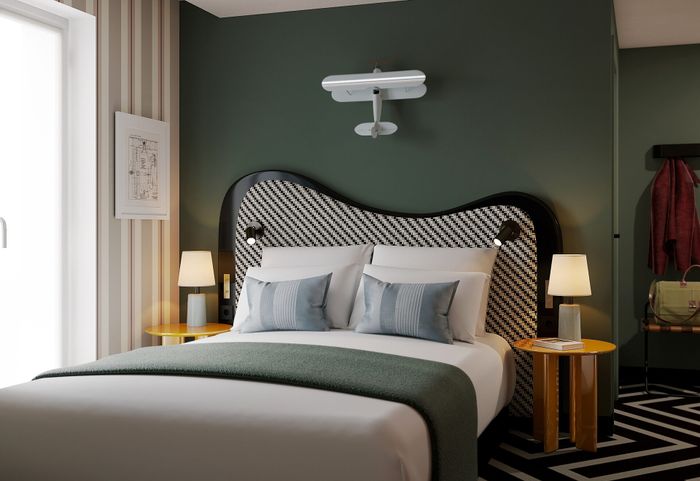
10 New Hotel Brands in 2024 and What We Can Learn
New Hotel Brands and What We Can Learn About the Growing Trends in the Hotel Business
6 Guest Behavior Trends in Hotel Design in 2024
6 Hotel Technology Trends in 2024
Introduction to Trendy Interior Design Styles in 2024
Outline
Introduction
Overview of New Hotel Brands
IHG - Garner
Marriott - Project MidX Studios
Hilton - Project H3
Hyatt - Hyatt Studios
Accor - Handwritten Collection
Hilton - Spark by Hilton
Langham - Ying'nFlo
Marriott - Apartments by Marriott
Wyndham - Echo Suites Extended Stay by Wyndham
Melia International - Falcon's Resorts by Melia
Insights and Trends in the Hotel Industry
Extended Stay Demand
Midscale and Affordable Luxury
Lifestyle and Personalization
Tech-Savvy Accommodations
Flexible and Versatile Spaces
Sustainability and Wellness
Conclusion
SEO Description
FAQ Section
Introduction
The hotel industry is rapidly evolving, responding to shifts in consumer preferences, market demands, and the post-pandemic landscape. Over the past year, several major hotel groups have introduced new brands with unique characteristics and target markets. Here, we explore ten new hotel brands and derive insights into the current and emerging trends shaping the hospitality industry.
Successfully growing a hotel brand involves staying updated on the latest trends and consumer expectations. Understanding guest behavior trends is crucial for tailoring your offerings to meet modern demands. Additionally, leveraging hotel technology trends can help enhance brand growth by providing innovative services and solutions.
Overview of New Hotel Brands
1. IHG - Garner
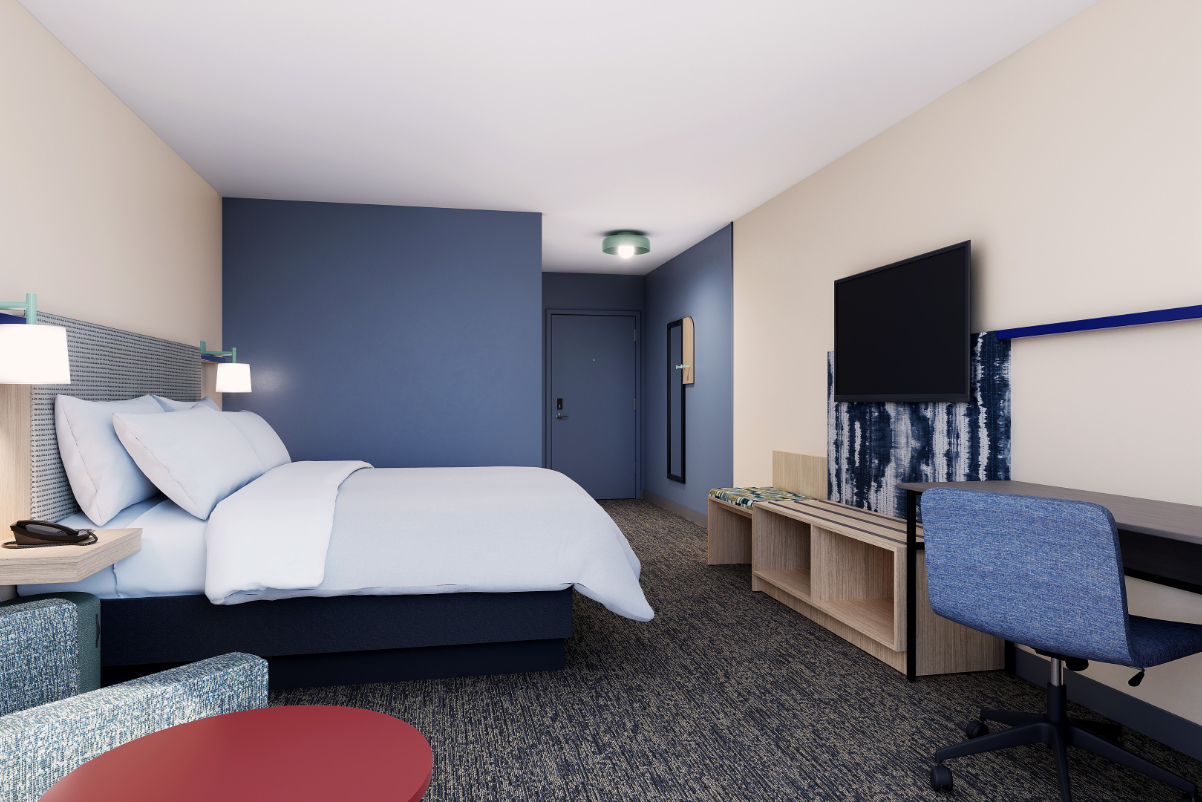 IHG Hotels and Resorts introduced Garner, a midscale conversion brand aiming for rapid expansion in the US, with plans to go global. Garner emphasizes convenience and comfort, offering free hot breakfast, pet-friendly amenities, and flexible lobby designs. This brand underscores the trend towards midscale accommodations that blend affordability with enhanced guest experiences.
IHG Hotels and Resorts introduced Garner, a midscale conversion brand aiming for rapid expansion in the US, with plans to go global. Garner emphasizes convenience and comfort, offering free hot breakfast, pet-friendly amenities, and flexible lobby designs. This brand underscores the trend towards midscale accommodations that blend affordability with enhanced guest experiences.
2. Marriott - Studio Res
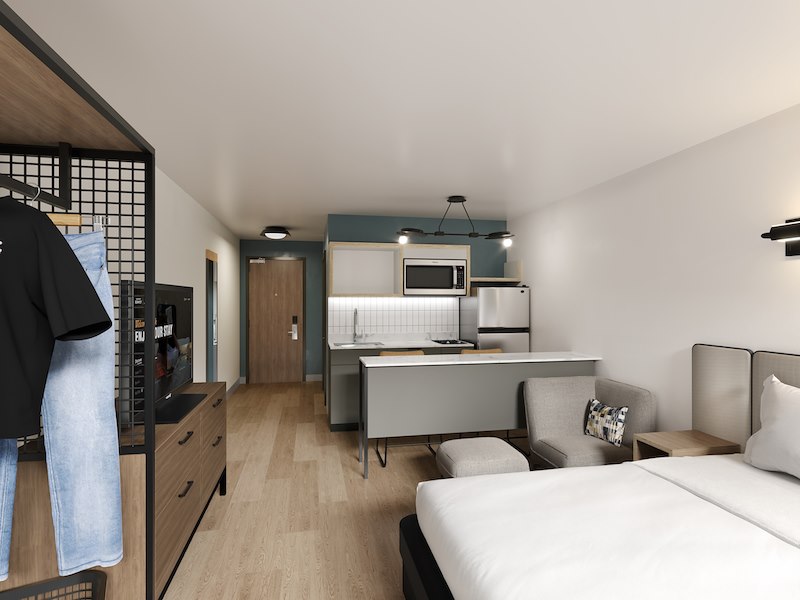 Marriott's Project MidX Studios targets the affordable midscale extended stay segment, providing modern comfort for guests staying 20+ nights. With features like in-room kitchens and on-site laundry facilities, it addresses the rising demand for affordable long-term accommodations, reflecting the growing importance of extended stay options.
Marriott's Project MidX Studios targets the affordable midscale extended stay segment, providing modern comfort for guests staying 20+ nights. With features like in-room kitchens and on-site laundry facilities, it addresses the rising demand for affordable long-term accommodations, reflecting the growing importance of extended stay options.
3. Hilton - Project H3
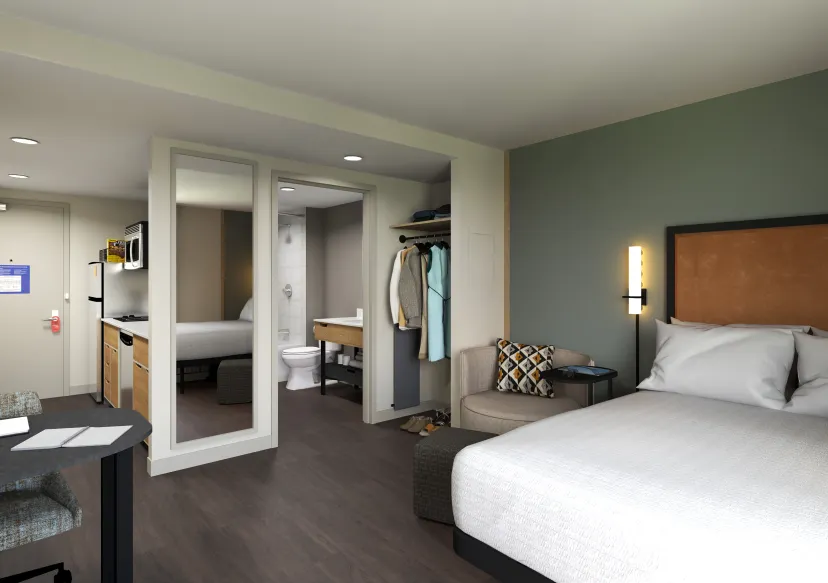 Project H3 by Hilton caters to lower-midscale extended stay travellers, offering apartment-style suites with fully equipped kitchens and multi-purpose furniture. This brand highlights the trend towards versatile living spaces that can serve as both work and rest areas, catering to the needs of modern, nomadic professionals.
Project H3 by Hilton caters to lower-midscale extended stay travellers, offering apartment-style suites with fully equipped kitchens and multi-purpose furniture. This brand highlights the trend towards versatile living spaces that can serve as both work and rest areas, catering to the needs of modern, nomadic professionals.
4. Hyatt - Hyatt Studios
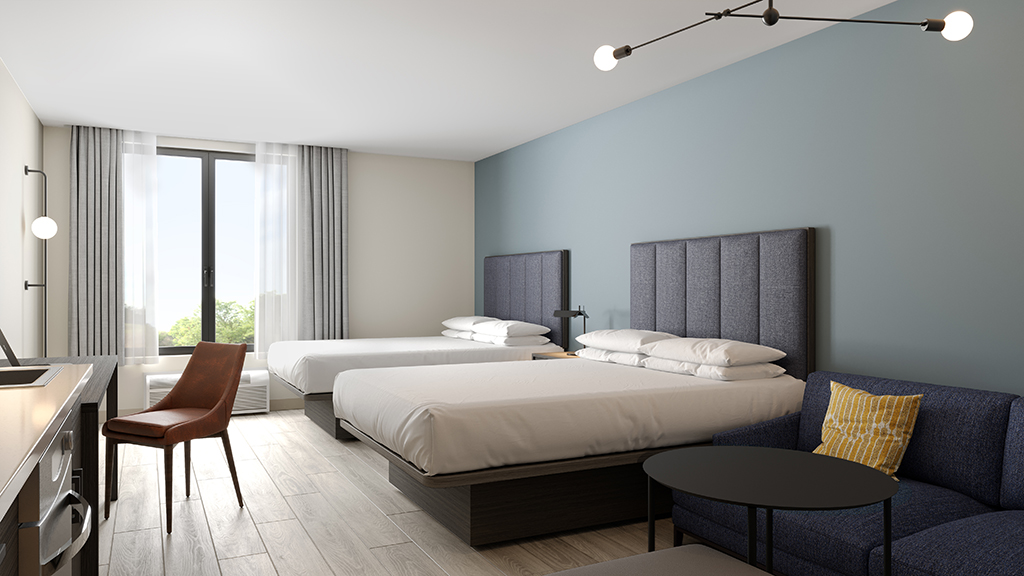 Hyatt Studios, the group's first upper midscale brand in the Americas, focuses on extended-stay guests with features like guest room kitchens and grab-and-go breakfasts. Its flexibility to accommodate both extended-stay and transient guests points to a trend where hotels are increasingly designed to be adaptable to various lengths of stay and guest profiles.
Hyatt Studios, the group's first upper midscale brand in the Americas, focuses on extended-stay guests with features like guest room kitchens and grab-and-go breakfasts. Its flexibility to accommodate both extended-stay and transient guests points to a trend where hotels are increasingly designed to be adaptable to various lengths of stay and guest profiles.
5. Accor - Handwritten Collection
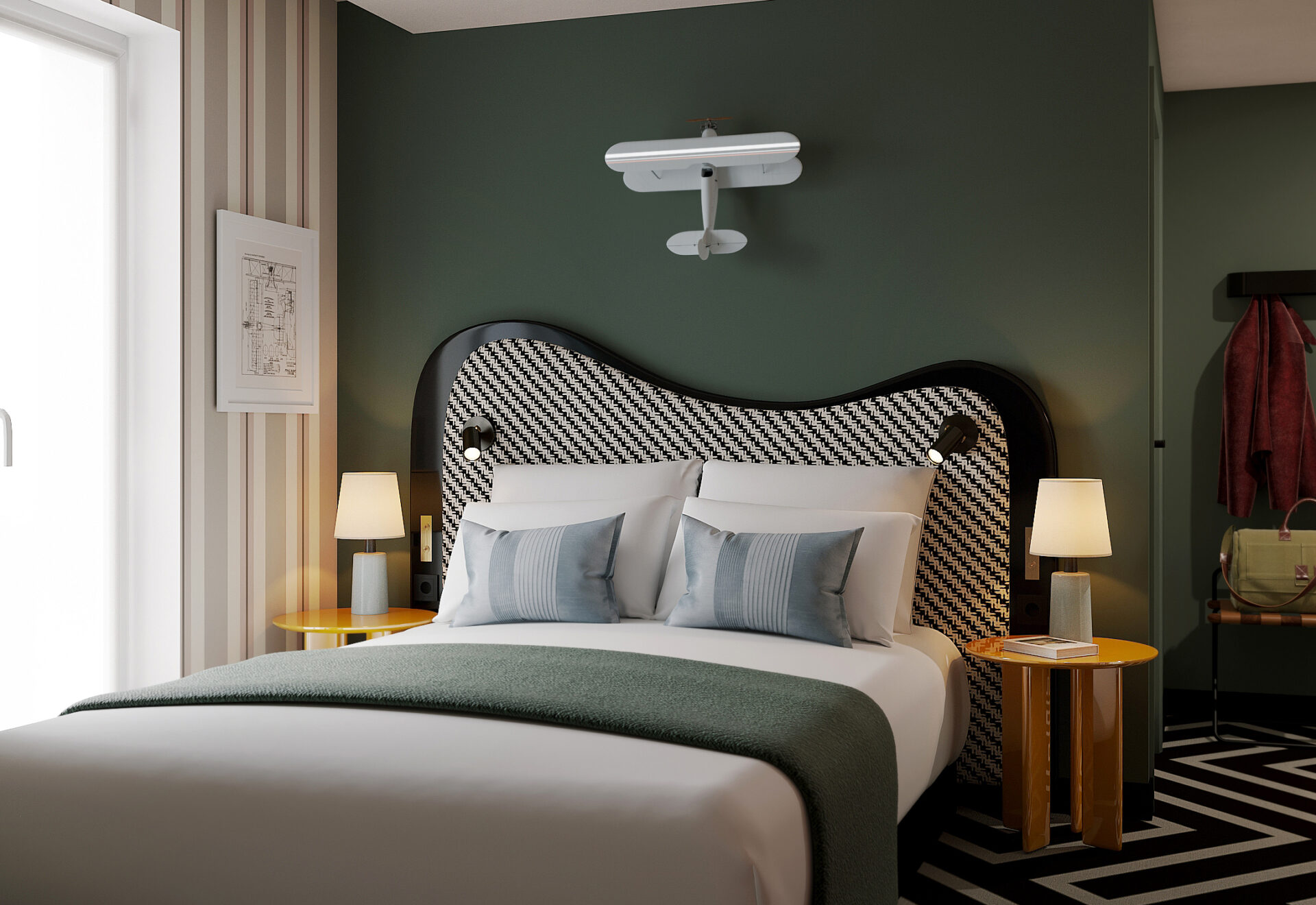 Accor's Handwritten Collection targets independent midscale hotels, offering a portfolio of charming bespoke properties. This collection brand aims for a unique and intimate hospitality experience, reflecting the trend towards personalized and distinctive stays that cater to travelers seeking authenticity and local charm.
Accor's Handwritten Collection targets independent midscale hotels, offering a portfolio of charming bespoke properties. This collection brand aims for a unique and intimate hospitality experience, reflecting the trend towards personalized and distinctive stays that cater to travelers seeking authenticity and local charm.
6. Hilton - Spark by Hilton
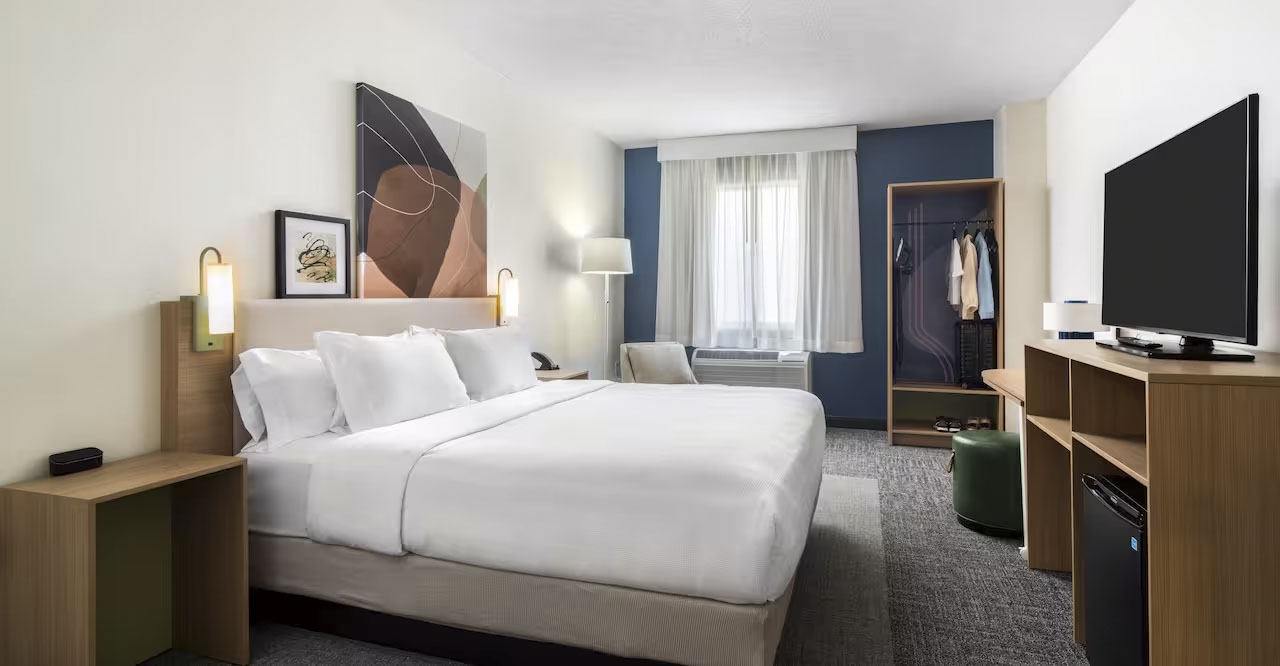 Spark by Hilton is aimed at the premium economy segment, focusing on providing consistent quality through required renovations. Its features include multi-purpose workstations and complimentary breakfast, indicating a trend towards budget-friendly options that do not compromise on essential amenities and quality.
Spark by Hilton is aimed at the premium economy segment, focusing on providing consistent quality through required renovations. Its features include multi-purpose workstations and complimentary breakfast, indicating a trend towards budget-friendly options that do not compromise on essential amenities and quality.
7. Langham - Ying'nFlo
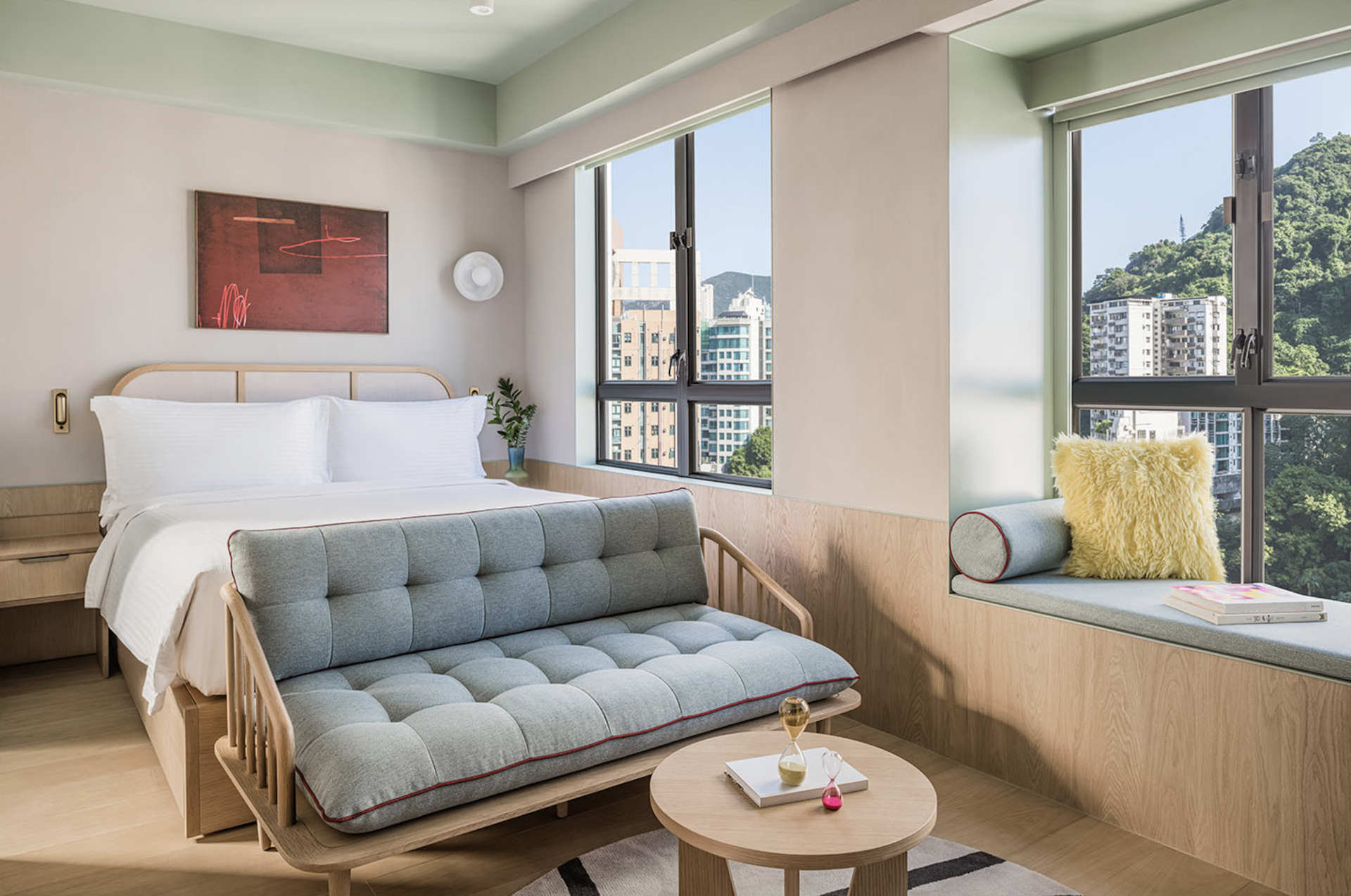 Langham's Ying'nFlo targets Millennials and Gen Z travellers, offering lifestyle accommodations that feel like a friend's apartment. With powerful showers, fast Wi-Fi, and smart home features, this brand highlights the trend towards lifestyle-focused hotels that appeal to younger, tech-savvy travelers looking for practical and well-designed spaces.
Langham's Ying'nFlo targets Millennials and Gen Z travellers, offering lifestyle accommodations that feel like a friend's apartment. With powerful showers, fast Wi-Fi, and smart home features, this brand highlights the trend towards lifestyle-focused hotels that appeal to younger, tech-savvy travelers looking for practical and well-designed spaces.
8. Marriott - Apartments by Marriott
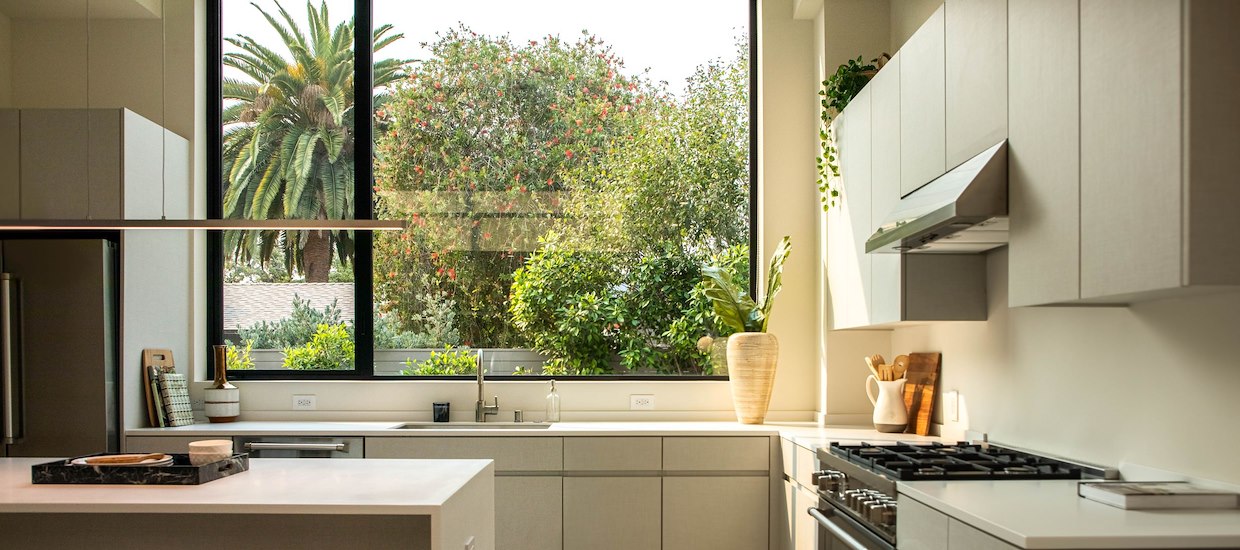 Apartments by Marriott is positioned in the upper-upscale and luxury segments, offering fully equipped apartments without traditional hotel services. This brand taps into the growing market for luxury serviced apartments, catering to guests seeking high-end residential-style accommodations with the flexibility of self-service.
Apartments by Marriott is positioned in the upper-upscale and luxury segments, offering fully equipped apartments without traditional hotel services. This brand taps into the growing market for luxury serviced apartments, catering to guests seeking high-end residential-style accommodations with the flexibility of self-service.
9. Wyndham - Echo Suites Extended Stay by Wyndham
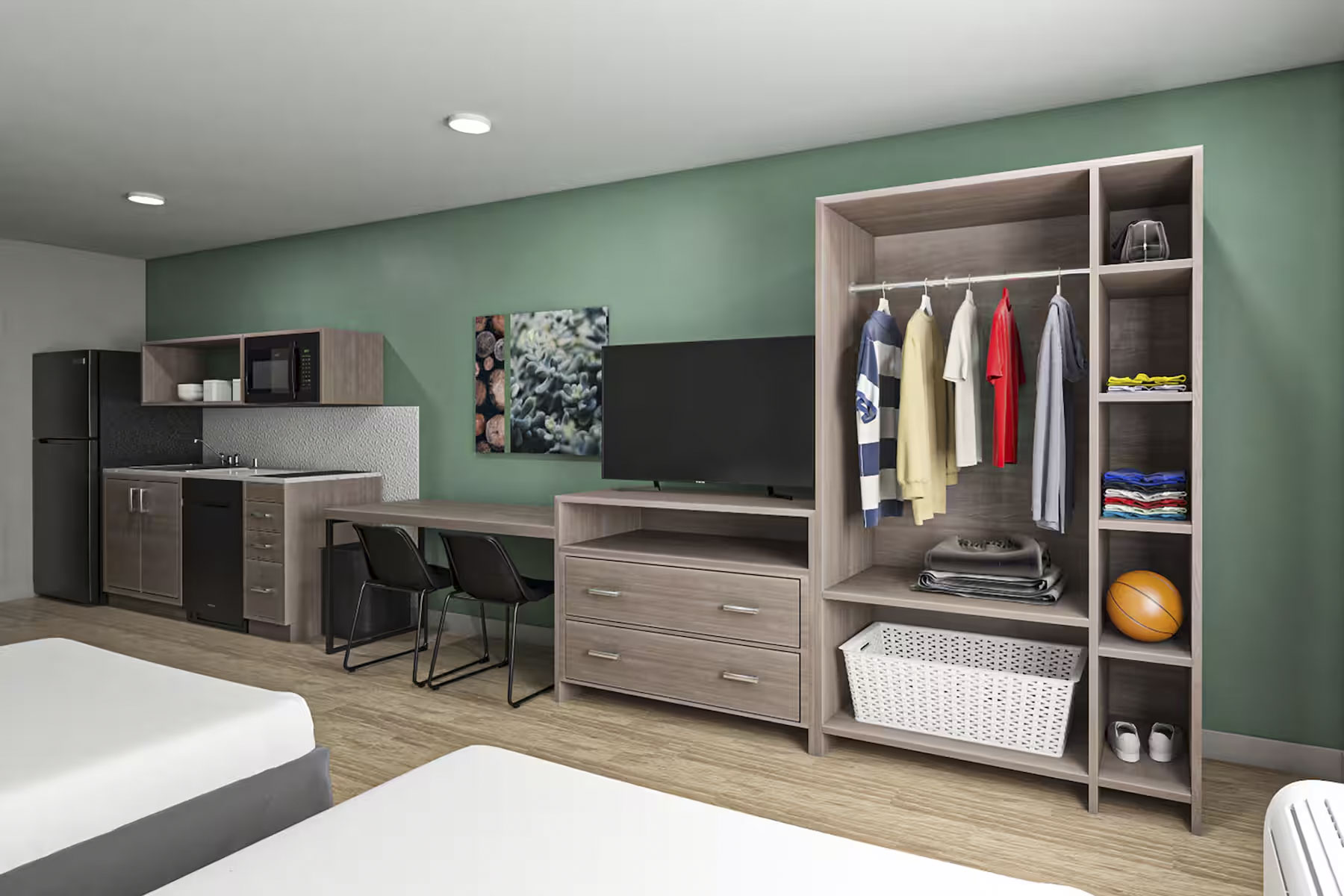 Echo Suites by Wyndham, designed for extended stays, features spacious studio suites with fitness and laundry facilities. This brand's rapid development and expansion underscore the increasing demand for extended stay options, especially in the midscale segment, reflecting a broader trend towards more versatile and long-term accommodation solutions.
Echo Suites by Wyndham, designed for extended stays, features spacious studio suites with fitness and laundry facilities. This brand's rapid development and expansion underscore the increasing demand for extended stay options, especially in the midscale segment, reflecting a broader trend towards more versatile and long-term accommodation solutions.
10. Melia International - Falcon's Resorts by Melia
Melia's Falcon's Resorts is an all-inclusive brand developed in partnership with Falcon’s Beyond, focusing on prime leisure markets. The transformation of existing Melia properties into Falcon’s Resorts illustrates the trend towards integrating entertainment and hospitality, providing immersive and comprehensive vacation experiences.
Insights and Trends in the Hotel Industry
1. Extended Stay Demand
Many new brands focus on extended stay accommodations, catering to professionals and travellers needing long-term lodging. This trend is driven by changing work habits and the rise of remote work.
2. Midscale and Affordable Luxury
There is a significant push towards midscale and affordable luxury options. Brands like Garner and Project MidX Studios offer enhanced experiences at competitive prices, reflecting the growing middle-class market and value-conscious travelers.
3. Lifestyle and Personalization
Hotels are increasingly designed to offer personalized experiences and lifestyle-oriented stays. Brands like Ying'nFlo and Handwritten Collection cater to younger demographics seeking unique and authentic travel experiences.
4. Tech-Savvy Accommodations
Modern travelers expect high-tech amenities, from smart home features to reliable Wi-Fi. Hotels are integrating technology to enhance guest convenience and satisfaction.
5. Flexible and Versatile Spaces
The new brands emphasize room design flexibility, catering to short- and long-term stays. This adaptability allows hotels to serve a broader range of guest needs and preferences.
6. Sustainability and Wellness
Many brands incorporate wellness features and sustainable practices, reflecting the growing consumer demand for health-conscious and eco-friendly accommodations.
Conclusion
The introduction of these ten new hotel brands showcases how the industry is evolving to meet travelers' changing needs. From extended stay options and affordable luxury to personalized experiences and tech-savvy accommodations, these trends highlight the dynamic nature of the hotel business and its continuous adaptation to market demands.
FAQ
What are the key trends in the hotel industry?
Key trends include extended-stay demand, midscale and affordable luxury options, lifestyle and personalization, tech-savvy accommodations, flexible and versatile spaces, and a focus on sustainability and wellness.
Which new hotel brands focus on extended stay accommodations?
Brands like Marriott's Project MidX Studios, Hilton's Project H3, Hyatt Studios, and Wyndham's Echo Suites Extended Stay focus on providing extended stay accommodations.
How are hotels adapting to the needs of modern travellers?
Hotels are integrating high-tech amenities, offering personalized and lifestyle-oriented experiences, and designing flexible spaces to accommodate both short—and long-term stays.
Why is there a push towards midscale and affordable luxury options?
There is a growing middle-class market and an increasing number of value-conscious travellers seeking enhanced experiences at competitive prices.
What role does technology play in modern hotel accommodations?
Technology enhances guest convenience and satisfaction through features like smart home systems, reliable Wi-Fi, and in-room tech amenities.
How are hotels incorporating sustainability and wellness?
Many new brands are integrating wellness features and sustainable practices, reflecting the growing consumer demand for health-conscious and eco-friendly accommodations.